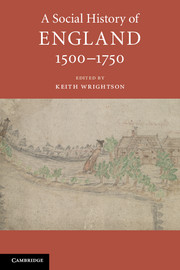Book contents
- Frontmatter
- Contents
- List of Figures
- List of Tables
- List of Contributors
- Acknowledgements
- List of Abbreviations
- Introduction: Framing Early Modern England
- PART I DISCOVERING THE ENGLISH
- PART II CURRENTS OF CHANGE
- 5 Reformations
- 6 Words, Words, Words: Education, Literacy and Print
- 7 Land and People
- 8 Urbanisation
- 9 The People and the Law
- 10 Authority and Protest
- 11 Consumption and Material Culture
- PART III SOCIAL IDENTITIES
- Coda: History, Time and Social Memory
- Further Reading
- Index
9 - The People and the Law
from PART II - CURRENTS OF CHANGE
Published online by Cambridge University Press: 28 May 2018
- Frontmatter
- Contents
- List of Figures
- List of Tables
- List of Contributors
- Acknowledgements
- List of Abbreviations
- Introduction: Framing Early Modern England
- PART I DISCOVERING THE ENGLISH
- PART II CURRENTS OF CHANGE
- 5 Reformations
- 6 Words, Words, Words: Education, Literacy and Print
- 7 Land and People
- 8 Urbanisation
- 9 The People and the Law
- 10 Authority and Protest
- 11 Consumption and Material Culture
- PART III SOCIAL IDENTITIES
- Coda: History, Time and Social Memory
- Further Reading
- Index
Summary
Introduction
During the sixteenth century, surprising numbers of English men and women fell under the spell of the law. By the early eighteenth century the love affair was fading, but the attachment and habits of mind remained strong, and it is difficult to overemphasise the law's influence on the nation in the decades and centuries following 1500.
Law courts, legal agents, legislation and proclamations constituted the main sinews of the emerging centralised state, and the willingness of ordinary English women and men to engage with the law, seen in record levels of criminal prosecutions and an explosion of civil litigation, proved central to the success of the whole state-forming process. Inter-personal litigation and a growing reliance on legal instruments contributed to a rise in contractual thinking that altered conceptualisations of personal and professional interactions and relationships. In literature, legal subjects saturated English Renaissance drama and developing courtroom concepts of proof and probability helped shape new narrative forms. Most obviously of all, laws and lawyers were at the centre of the great constitutional upheavals of the age, from the legally engineered reformation of religion and Henry VIII's and Edward VI's attempts to appoint their successors, to the lawyer-dominated parliaments that challenged and then executed King Charles, and later framed the Bill of Rights that supposedly made the Glorious Revolution glorious. Participants in these and other political dramas drew heavily from a deep well of legal language and concepts that resonated in the public imagination, including Magna Carta, habeas corpus, the ancient constitution and the true liberties of the freeborn citizen. Scholars used to examine each of these parts of the law in isolation. Now – thanks to decades of pioneering work in a range of related fields – social, as well as cultural, political, economic and gender historians are beginning to realise the astonishing extent to which law in all its varied forms permeated early modern society and acted as a key determinant of change.
Legal Structures
Almost all of the defining elements of the English justice system were already in place in 1500. The monarch presided at the apex of the legal system, as the font of justice, supposedly protecting the life, liberty and property of English subjects and dispensing mercy to temper the harshness of the criminal law.
- Type
- Chapter
- Information
- A Social History of England, 1500–1750 , pp. 199 - 220Publisher: Cambridge University PressPrint publication year: 2017



